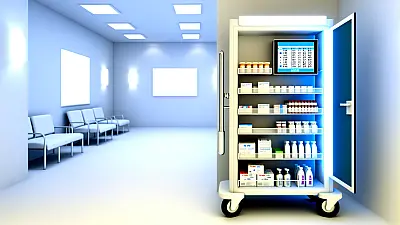CROWN POINT, IN - Federal inspectors cited Crown Point Christian Village for multiple serious violations of medication administration protocols and infection control standards following a complaint investigation in August 2024.

Critical Medication Administration Errors
Unsafe Feeding Tube Practices
Inspectors observed significant departures from standard medical protocols during the administration of medications through feeding tubes. A licensed practical nurse was observed administering multiple medications to a resident with Alzheimer's disease without following established safety procedures.
The nurse failed to verify proper tube placement before administering medications, a critical safety step that prevents medications from being delivered into the lungs rather than the stomach. This verification process involves checking for gastric contents before medication administration, which the nurse only performed midway through the process after realizing the oversight.
Additionally, the nurse forced medications through the feeding tube using a syringe plunger rather than allowing gravity flow, which is the accepted standard. Forcing medications can increase the risk of tube damage and improper medication delivery. The facility's own policy required medications to be administered by gravity with only gentle pressure if necessary.
The nurse also failed to flush the feeding tube with water between individual medications, as required by both facility policy and medical training standards. Proper flushing prevents medication interactions and ensures complete medication delivery.
Missed Critical Medications and Hydration
The same resident missed essential morning medications on the day of inspection, including medications for Alzheimer's disease, vitamins, and stomach protection. The resident also did not receive prescribed feeding tube flushes at scheduled times, which are critical for maintaining proper hydration and preventing tube blockages.
Prescribed water flushes of 325 cubic centimeters every six hours were not administered at two scheduled times, representing a significant fluid deficit that could lead to dehydration in a resident entirely dependent on tube feeding for nutrition and hydration.
Respiratory Care Protocol Failures
Inspectors documented inadequate monitoring during respiratory treatments for residents requiring nebulizer therapy. A nurse administered breathing medication via nebulizer without conducting required assessments before, during, or after the treatment.
Proper nebulizer administration requires monitoring lung sounds, respiratory rate, pulse, and blood pressure to assess treatment effectiveness and identify potential complications. These assessments help healthcare providers determine if the medication is working and whether the resident is experiencing any adverse reactions.
The nebulizer equipment was also improperly cleaned after use. Medical equipment used for respiratory treatments must be thoroughly rinsed and dried after each use to prevent bacterial growth and cross-contamination between residents.
Infection Control Deficiencies
Medical Equipment Contamination Risks
The facility failed to properly sanitize medical equipment used on multiple residents, creating potential pathways for infection transmission. A blood glucose monitor used to test blood sugar levels was not sanitized between residents, despite facility policy requiring cleaning after each use.
An oxygen saturation monitor was also observed being used on a resident and then stored without sanitization, potentially spreading pathogens to the next resident requiring monitoring.
Enhanced Barrier Precautions Non-Compliance
Multiple staff members demonstrated lack of awareness regarding Enhanced Barrier Precautions (EBP), a infection control protocol designed to prevent transmission of resistant organisms and protect residents with medical devices like catheters and feeding tubes.
Staff were observed providing care to residents with urinary catheters, feeding tubes, and wounds without wearing required protective gowns. Several nursing assistants indicated they were unfamiliar with EBP requirements or had not received training on these protocols.
The facility's infection control policy clearly outlined that EBP should be implemented for residents with wounds, indwelling medical devices, or multi-drug resistant organisms, with appropriate personal protective equipment stored immediately outside residents' rooms.
Medical Significance and Standards
These violations represent departures from fundamental medical safety principles. Proper feeding tube management prevents aspiration pneumonia, medication errors, and dehydration complications. Respiratory treatment monitoring helps identify adverse reactions and ensures therapeutic effectiveness.
Infection control protocols are particularly critical in nursing home settings where residents often have compromised immune systems and multiple medical devices that create infection risks. Enhanced Barrier Precautions specifically target high-risk situations involving medical devices that provide direct pathways for pathogen transmission.
Additional Issues Identified
The inspection also revealed problems with enteral feeding equipment labeling and replacement schedules. A feeding tube bag was observed without proper identification labels, and equipment replacement schedules were not being followed according to physician orders.
The violations occurred across multiple departments and shifts, suggesting systemic issues with staff training and protocol compliance rather than isolated incidents.
Full Inspection Report
The details above represent a summary of key findings. View the complete inspection report for Crown Point Christian Village from 2024-08-14 including all violations, facility responses, and corrective action plans.
💬 Join the Discussion
Comments are moderated. Please keep discussions respectful and relevant to nursing home care quality.